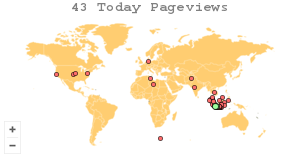ISLAM DAN FUNDAMENTALISME: ANALISIS AYAT AL-QUR’AN TENTANG FUNDAMENTALISME DALAM ISLAM
(Kajian Tafsir Maudhu’i)
DOI:
https://doi.org/10.47498/bashair.v3i1.2054Keywords:
Al-Qur'an, Fundamentalism, IslamAbstract
This study intends to examine the understanding of fundamentalism that exists in society as one of the discussions on contemporary issues in the Islamic religion using the perspective of maudhu'i interpretation in the Koran. The research method that we used in writing this research is a qualitative method, namely by collecting accredited journals to serve as references and reading material and taking references to several reliable sources. To interpret the verse we use the thematic interpretation method, namely by searching for the word to be interpreted, then looking for the intended theme of the verse and presenting the verse and its translation and writing the asbabun nuzul and its interpretations. Beginning with choosing words in the Koran that are in accordance with meanings that are close to fundamentalism, then studied and examined using maudhu'i interpretations. This research presents and describes the problems of Muslims who still use fundamentalism and do not want to open themselves to other than their group, as well as people who understand religion rigidly and are fixated on texts alone.
References
Adib Bisri, & Munawwir AF. (1999). Kamus al-Bisri. Pustaka Progresif.
Ahmad Bin Ali Bin Hajar. (n.d.). Fathul Bari’. Al-Maktabah As-Salafiyyah.
Ahmad Warson Munawwir. (1997). Al-Munawwir. Surabaya Pustaka.
Basyir, K. (2017). Perjumpaan agama dan budaya: melacak konsep dan ideologi Gerakan keagamaan di Indonesia.
Dakwah, A. F., Kekerasan, D., & Dahlan, F. (n.d.). Fundamentalisme Agama: Atas Nama Agama.
Dakwah, J., Komunika, P., & Ratnasari, D. (2010). FUNDAMENTALISME ISLAM. 4(1), 40–57.
Fahmi, M. (2016). Radikalisme Islam dalam Refresentasi Media di Thailand.
Harry Mc Mullan. (n.d.). Understanding Christian Fundamentalism. Retrieved June 20, 2023, from http://www.ubfellowship.org/archive/readers/doc176.htm
Hasan Hanafi. (1982). Al-Din wa al-Tsaurah fi Mishr.
Imam Ibnu Daqiq al-Ied. (2012). Syarah al-Arbain an-Nawawiyyah. Dar Ibn Hazm.
Jalaluddin Al-Mahalli, & Jalaluddin as-Suyuthi. (n.d.). Tafsir Al-Qur’an al-Adzim. Daarul Ilmi.
John M. Echols, & Hasan Shadily. (1979). Kamus Bahasa Inggris Indonesia. PT. Gramedia.
Komarudin, D. (2016). Pusat penelitian dan penerbitan Lembaga penelitian dan pengabdian kepala masyarakat UIN Sunan Gunung Djati Bandung.
Louis Ma’luf. (1977). al-Munjid Fil Lughah. Dar al-Masyriq.
M. Amin Rais. (1986). Islam di Indonesia . Rajawali.
M. Imadadun Rahmat. (n.d.). Arus Baru Islam Radikal Transmisi Revivalisme Islam Timur Tengah Ke Indonesia .
M Irwin Barrent. (1990). Fundamentalisme: Hazard and Heartbreak.
Mohammed Arkoun. (1999). Membongkar Wacana Hegemonik Dalam Islam dan Postmodernisme. Al-Fikr.
Muhammad Ali As-Shobuni. (2020). Shofwatu Tafassir. ad-Darul Alamiyyah.
Muhammad Imarah. (1998). Al-Ushuliyyah Baina al-Gharb wa al-Islam.
Muhammad Umar al-Sewed. (n.d.). Sikap Tengah Ahl Sunnah Diantara Ifrath dan Tafrith. 10.
Roger Garaudy. (1993). Islam Fundamentalis dan Fundamentalis Lainnya. Bandung Pustaka.
Rosidah, N., & Walisongo, W. W. (2012). Fundamentalisme Agama (Vol. 20, Issue 1). http://www.
Rosyid, H. (2018). Kontruksi Wacana Fundamentalisme Islam di Media Sosial .
Tim Penyusun Departemen Pendidikan dan Kebudayaan RI. (1991). Kamus Besar Bahasa Indonesia. Balai Pustaka.
Downloads
Published
Issue
Section
License
Authors who publish articles in Basha'ir: Jurnal Studi Al-Qur'an & Tafsir agree to the following conditions:
- The author retains copyright and grants the Basha'ir Journal the right from the first publication with the work simultaneously licensed under a Creative Commons Attribution-ShareAlike 4.0 International (CC BY-SA 4.0) license that allows others to make changes, adjust and build on the work with recognition of the author's work and initial publication in the Journal.
- Authors are allowed to copy and redistribute published versions of works in journals (for example, posting them to institutional repositories or publishing them in a book), with recognition of their initial publication in Basha'ir: Jurnal Studi Al-Qur'an & Tafsir.
- Authors are allowed and encouraged to post their work online (for example, in institutional repositories or on their websites) before and during the submission process, as it can lead to productive exchanges, and increase citations of published works






